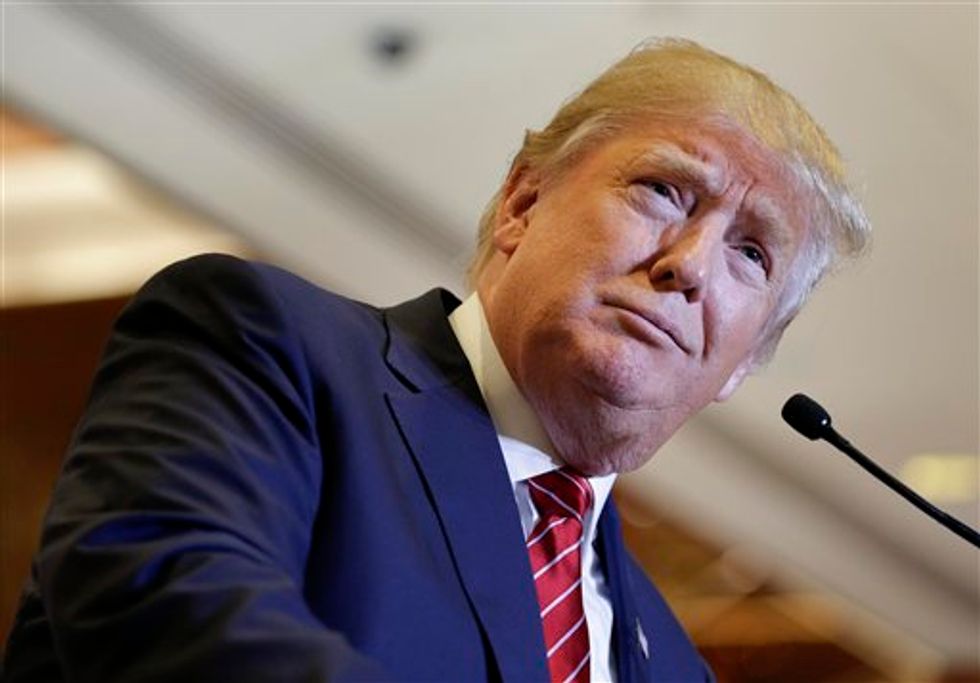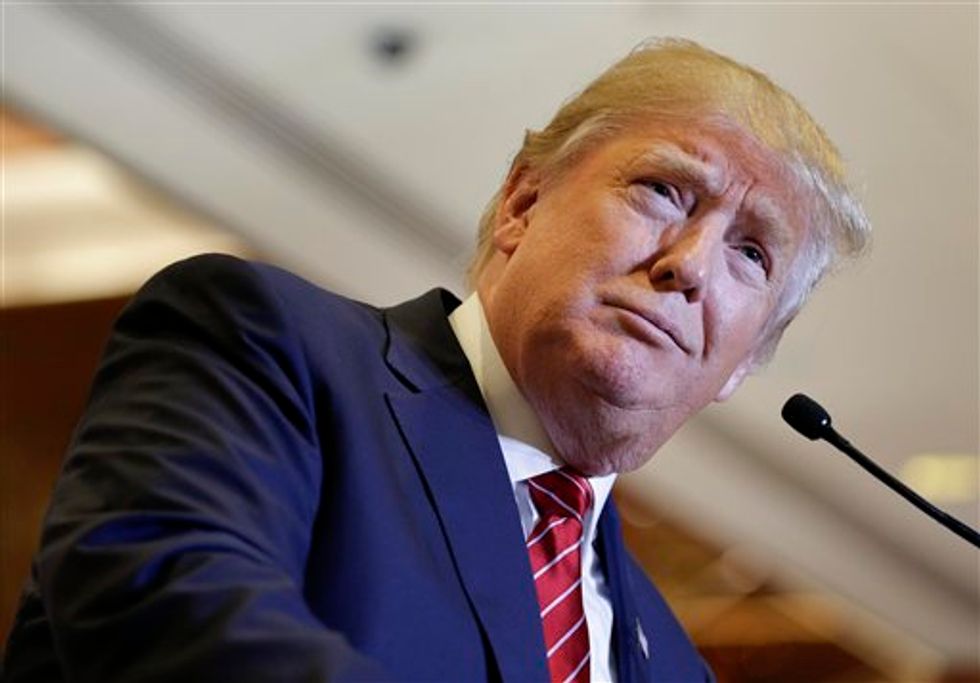Donald Trump’s tax reform proposal is thorough and serious. It has been compared to President Ronald Reagan’s tax reform of the 1980s, and in many ways it is similar.
Like Reagan, Trump would eliminate many deductions, increasing the effective tax burden on the “very rich.” He would reduce rates across the board and eliminate taxes for couples earning up to $50,000 per year and for singles making up to $25,000 — meaning 31 million households would no have no income tax bill.
 Republican presidential candidate Donald Trump pauses while speaking about his tax plan during a news conference, Sept. 28, 2015, in New York. (AP/Julie Jacobson)
Republican presidential candidate Donald Trump pauses while speaking about his tax plan during a news conference, Sept. 28, 2015, in New York. (AP/Julie Jacobson)
While that makes for a great headline, it has very little real impact. Currently those earning up to $47,000 are net beneficiaries of the tax code.
Trump would also reduce corporate taxes and eliminate the death tax and the alternative minimum tax. He would reduce the number of tax brackets from seven to four, including a zero percent bracket.
Untouched is the Earned Income Tax Credit that rebates both income and payroll taxes paid by lower income taxpayers. Trump makes no effort to fix that provision which has become a $55 billion welfare program, in which more than 20 percent of the payments are in error.
Trump’s and Reagan’s proposals are similar in another respect. They are both temporary “fixes” of a broken system. In the 20 years following the 1986 reform, it was amended 15,000 times and now comprises 75,000 pages in the federal register. Absent a constitutional amendment, this reform will not survive for long either.
Republican presidential candidates Sen. Rand Paul (Ky.), Sen. Ted Cruz (Texas), Dr. Ben Carson, former Gov. Jeb Bush (Fla.), former Sen. Rick Santorum (Pa.) and Sen. Marco Rubio (Fla.) have also proposed specific reforms of the income tax system that would eliminate many deductions and reduce the number of tax rates.
All of these proposals promise relief for the middle class and have been criticized for giving too much tax relief to the rich. That charge is true. Lower tax rates will benefit the people who pay the taxes.
Today, the top 1 percent of income earners in America receive 17 percent of all income while paying 46 percent of all income taxes. When you reduce tax rates, those who pay nearly half of all taxes will get more relief than those who pay nothing.
What disappoints is the pandering on this issue from both Democrats and Republicans.
Former Sen. Russell Long (D-La.) once explained the thinking behind tax reform: “Don’t tax him. Don’t tax me. Tax that man behind the tree.”
The "man behind the tree" is the rich guy, and the rest of us say, “Go get him, but cut me loose.”
Each of these candidates, like President George W. Bush before them, wants to be able to say that they are removing Americans from the tax rolls. Shame on them.
People who don’t pay taxes are disproportionately beneficiaries of government benefits. Removing people from the tax rolls increases the demand for more government since they aren’t paying for it.
The tax code ought to be for raising the necessary revenues to fund the programs of government. It should not be used to pick winners and losers.
Picking winners and losers is for tyrants — and the tyrant today is the criminal enterprise known as the Internal Revenue Service.
While many pay lip service to eliminating the IRS, none of these proposals does that. So long as we tax income, a federal agency is necessary to audit how we arrive at net income against which a tax is levied. We can rename that agency, but it cannot be eliminated.
Only former Gov. Mike Huckabee (R-Ark.) supports real tax reform. Huckabee supports the FairTax, which would eliminate all taxes on income and replace them with a retail sales tax on new goods and services bought for personal consumption.
There would be no taxes on businesses. No taxes on savings or investment. NO IRS!
That is correct. No federal agency will know more about us than we tell our children.
The tax would be collected by the states, and they — and the retailer — would be compensated for collecting and remitting the revenue.
Under the current system, the average income earner gives the government 23 percent of what he earns — 15 percent in income taxes and 8 percent in payroll taxes.
Under the FairTax, we would pay 23 percent of what we spend. What we don’t spend would not be taxed.
Essentials would be untaxed by providing a prebate, a cash distribution that would go to every household, based on the number of people in the household. A family of four could spend about $32,000 with no tax consequences. Beyond that, we are all voluntary taxpayers, and we will all pay the same.
The FairTax offers us a life with no record keeping, no compliance burdens, no tax returns — and April 15 will be just another spring day.
–
TheBlaze contributor channel supports an open discourse on a range of views. The opinions expressed in this channel are solely those of each individual author.


 Republican presidential candidate Donald Trump pauses while speaking about his tax plan during a news conference, Sept. 28, 2015, in New York. (AP/Julie Jacobson)
Republican presidential candidate Donald Trump pauses while speaking about his tax plan during a news conference, Sept. 28, 2015, in New York. (AP/Julie Jacobson)


